Exiled Prince Criticizes Iran-US Prisoner Exchange Deal
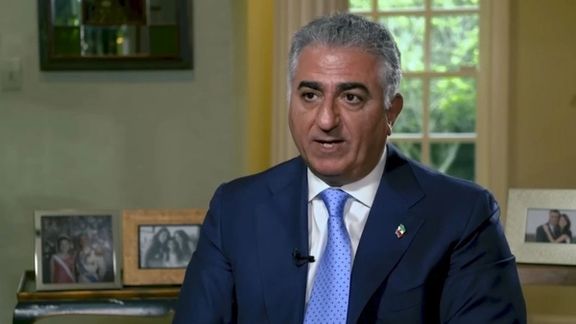
Iranian exiled Prince Reza Pahlavi has renewed his criticism of the recently revealed prisoner exchange deal between Tehran and Washington.

Iranian exiled Prince Reza Pahlavi has renewed his criticism of the recently revealed prisoner exchange deal between Tehran and Washington.
He denounced it as a $6 billion “ransom payment” to the Islamic Republic for the release of five dual-national hostages. "As I have said before, I strongly oppose sending money to the Islamic Republic, especially while this regime, as is its very nature, is engaged in repression at home and terror abroad," Pahlavi posted on X.
He underscored the timing of this deal, suggesting it was intended to undermine the spirit of Mahsa Day when Iranians both inside and outside the country are preparing for protests. According to the exiled prince, the transaction serves to "sap the hope of Iran's freedom fighters and to empower the repressive Islamic Republic." He added, "It is also a gift to this regime and the criminal Ebrahim Raisi as he travels to New York."
Pahlavi issued a warning to the current American administration, cautioning that the Iranian people will not forget those who turned their backs on them during their most challenging moments and instead stood by their oppressors.
He concluded his statement with a message of resilience to the Iranian population, urging them to continue the struggle: "My compatriots, feed the flame of hope in your hearts. The Islamic Republic is going to fall because you, the great nation of Iran, are standing against it."
The reported deal comes amid speculation that $6 billion of unfrozen Iranian funds will be transferred from South Korea to banks in Qatar, triggering a process that could lead to the release of detained dual-national hostages on both sides.
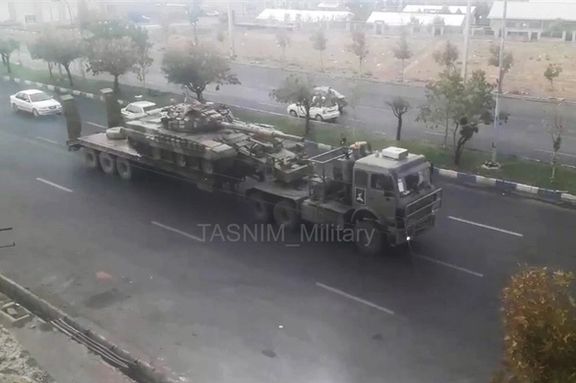
The ground forces of the Islamic Revolutionary Guard Corps (IRGC) have deployed forces to the northwestern borders of Iran where tensions have been rising between Iran and Kurdish separatist groups.
Iran recently gave an ultimatum to Iraq to disarm “separatist terrorist groups” operating in the Kurdistan region and according to reports from the Tasnim News Agency, the IRGC's ground forces aim to “bolster security measures along the northwestern borders of the Islamic Republic” as the deadline for the ultimate approaches.
The timing of the deployment coincides with the anniversary of Kurdish-Iranian Mahsa Amini's death, which also threatens to bring the masses to the streets this week, causing the regime to step up security nationwide, not only on its fragile borders.
While the Islamic Republic categorizes Iranian Kurdish armed groups as "terrorist groups," the groups maintain that their armed campaigns are driven by the pursuit of Kurdish rights and autonomy after years of oppression.
In recent times, the Iranian regime has intensified its crackdown on Kurdish-majority towns and cities in the western provinces of the country. The majority of Iran's estimated 10 million Kurds reside in the western regions of the nation.
Furthermore, the Islamic Republic has repeatedly conducted military operations against Iranian Kurds seeking refuge in Iraqi Kurdistan, further exacerbating regional tensions.
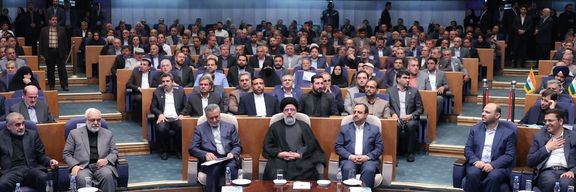
Iranian academic Mahmoud Sariolghalam, an expert on development and political science, says Iran should strive to reach a deal to eliminate US sanctions.
Sariolghalam also insisted in an interview with Khabar Online that membership in the Shanghai Cooperation Organization and BRICS will not help Iran unless it maintains healthy relations with the rest of the world. The biggest service Iranian lawmakers, policy makers and decision-makers can do to the nation is trying to relieve the country of the sanctions and pave the way for constructive international relations.
A graduate of the USC and the Ohio State University, Dr. Sariolghalam who teaches at the Beheshti University in Tehran, suggested in this interview that Iran should start liberalization before democratization and prioritize economic development before starting political development as a way out of its current crisis.
He also added that having experts as members of the parliament is part of the way out of the crisis. He said the main concern for officials should be one of economic development because a country without an income cannot have social or cultural growth.
Emphasizing the need for expertise within the government, Sariolghalam highlighted that economic development and governance are akin to sciences like medicine and engineering. He went on to state that holding numerous conferences each year is not necessary to grasp this concept. He further underscored that given the current state of affairs in Iran, the country cannot progress in a manner comparable to the development seen in countries like South Korea, Singapore, Mexico, Brazil, and Indonesia.
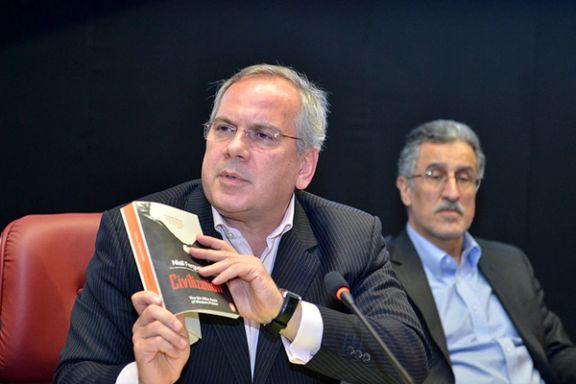
Hinting at the pitfalls of government and military control of the economy, he pointed out that in countries like China, Turkey, and Mexico, governments separated the realms of resource management and ownership to foster development. Conversely, India achieved development when its military recognized the necessity of separating ownership from the state.
Sariolghalam said officials need to understand that high significance is attached to expertise in Qatar and Saudi Arabia to ensure their development. He added that the ability to communicate with the outside world should be a key criterion for appointing ministers and electing lawmakers. He warned that during the next 20 years, a vast gap will emerge between Iran and Arab countries.
He also cautioned that Iran cannot grow if the government wishes to control 95 percent of all resources and leave only 5 percent for the private sector. Elsewhere in the interview, Sariolghalam said the West's problem with Iran is not about the nuclear issue, it is about Iranian officials' attitude toward Israel and the Jewish people. The JCPOA could not solve the conflict between Iran and the West and that is why it was not successful.
Meanwhile, in another interview with Khabar Online, former commander of the IRGC navy Hossein Alaei, who has been known as an academic in the Iranian universities as well as a reformist political figure during the past three decades, said that "halfway through President Ebrahim Raisi's four-year term of office, the government is beginning to realize that Iran's economic problems will not be solved unless the sanctions are lifted."
He also added that Iran's membership in international organizations such as BRICS and SCO can be helpful only in the absence of sanctions. Speaking about the hindrances to Iran's development, Alaei said that US sanctions are the main obstacle.
The former commander emphasized that Iranian officials must alter their approach towards the West, particularly the United States. He regarded Iran's enmity with the US as the nation's most pressing issue, noting that the current sanctions make it unlikely for any country to consider cooperating with Tehran. He urged a reduction in this perilous level of hostility towards the United States.
"All officials should make economic development their number one priority," Alaei underlined.
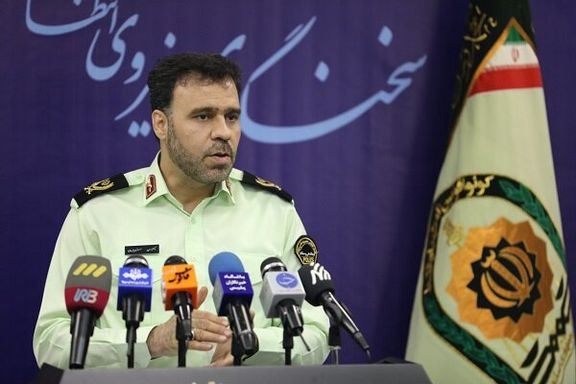
On the occasion of the first anniversary of the death of Mahsa Amini, the Australian government has taken action to further sanction Iran for its human rights abuses.
It is the first time targeted financial sanctions and travel bans have been put in place on regime figures under the recently expanded Iran autonomous sanctions framework.
The sanctions, designed to address the ongoing oppression faced by Iranians, especially women and girls, will target four individuals and three entities directly involved in systemic rights abuses.
Among the sanctioned individuals is Saeed Montazerolmahdi, the spokesperson for Iran's Law Enforcement Forces, who has repeatedly used intimidating and threatening language towards Iranian women and girls alleged to have violated Iran's mandatory veiling laws.
The targeted entities include Iran's Cyber Police, which plays a central role in stifling freedom of expression by restricting internet activity in Iran. Additionally, Press TV, the state-backed TV channel, has come under scrutiny for broadcasting forced confessions of Iranians and dual-nationals who face politically motivated judicial procedures.
Australia also reiterated its commitment to taking measured and effective action against those responsible for egregious human rights violations in Iran.
The Australian government further called upon the Iranian regime to hold accountable those responsible for the death of Mahsa Amini, one year on, nobody still held accountable for her murder in morality police custody.
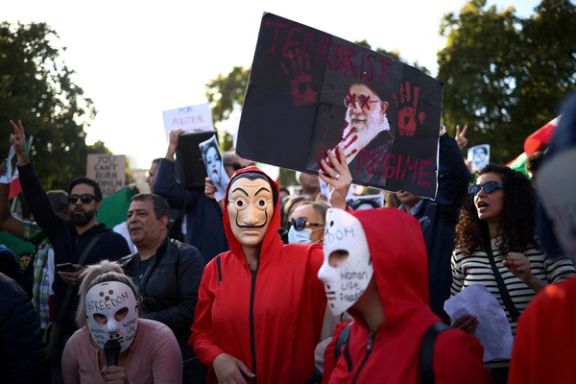
Like other prominent Iranian dissidents, Hamed Esmaeilion of Canada is urging the West to “stop appeasing the Islamic Republic” and “not hinder” the anti-regime movement.
In a note published Monday on his Instagram account ahead of last year’s nationwide protests anniversary on September 16, Esmaeilion accused the regime of simultaneously continuing its “hostage-taking policy” and “obeisance to China and Russia” to force the West into deals with the Islamic Republic.
Esmaeilion also said he would join other Iranians in Toronto, Canada, on September 16 “to chant “Woman, Life, Freedom”, the signature slogan of the movement that was sparked by the death of 22-year-old Mahsa Amini in the custody of morality police. “I know that sooner or later the Iranian people will topple the Islamic Republic.”
“We will neither forgive nor forget,” Esmaeilion, a dentist-writer who turned into a fierce activist when he lost his wife and young daughter in the downing of a commercial flight over Tehran in January 2020 by the Revolutionary Guards (IRGC), wrote.
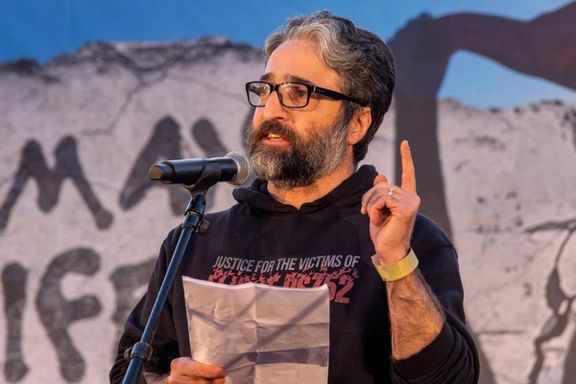
Expatriate Iranian have been planning anniversary demonstrations in several major world cities on Saturday some of which, including in Montreal, Canada, will be held outside US embassies and consulates.
A small group of Iranians staged a rally Monday outside the US Consulate in Toronto to protest what they allege is US government and Canadian “appeasement of the Islamic Republic.”
They were referring to the Biden administration’s decision to unfreeze $6b of the Islamic Republic’s frozen assets in South Korea and “encouraging hostage diplomacy by paying ransom” as well as demanding the US to impose maximum pressure on the regime.
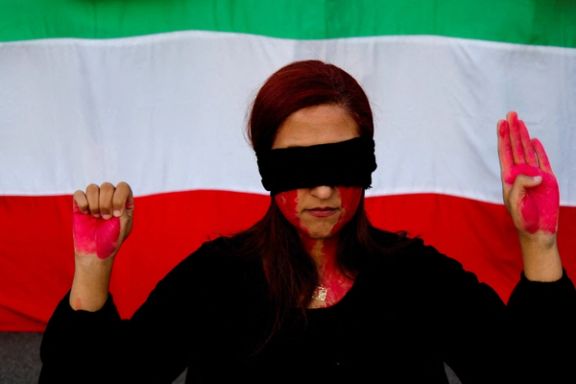
On Monday, the US Congress was informed that Secretary of State Antony Blinken has signed a waiver to allow international banks to transfer $6 billion of Iran’s frozen assets in a hostage release deal with Tehran. The State Department says Blinken determined that waiving the sanctions was in the national security interests of the United States.
Both Washington and Tehran since announcing the prisoner swap deal in August had claimed that the prisoner swap deal and the unblocking of the frozen funds were unrelated, but the waiver clearly links the two as one agreement.
"Allowing these funds to be transferred from restricted Iranian accounts held in the (Republic of Korea) to accounts in Qatar for humanitarian trade is necessary to facilitate the release of these US citizens," a US document seen by Reuters on Monday said.
The deal involves the release of five American citizens held in Iran and five Iranians held in the US. American lawmakers have been harshly criticizing the Biden administration for what they say is effective paying a huge ransom, which will only encourage the Iranian regime and endanger more Americans.
Other Iranian figures including exiled Prince Reza Pahlavi and activist Masih Alinejad have on many occasions in the past few years criticized the West for “appeasing the terrorist regime”.
In a Wall Street Journal opinion piece in August last year, the former crown prince said the way Western powers interacted with the Islamic Republic had emboldened it to continue its repressive measures against Iranians with greater immunity.
“Iranian people are not asking the Western countries to save them, they are asking the West to stop saving the Islamic Republic,” Alinejad said in a speech at Italy’s Senate in February.
“The West has always shown weakness against the Islamic Republic’s hostage-taking strategy and still wants to continue appeasing this government,” Canada-based data scientist and activist Ali Ashtari told Iran International TV in February, demanding that Western politicians and expatriate Iranians who “surrender to such humiliation be disgraced.”
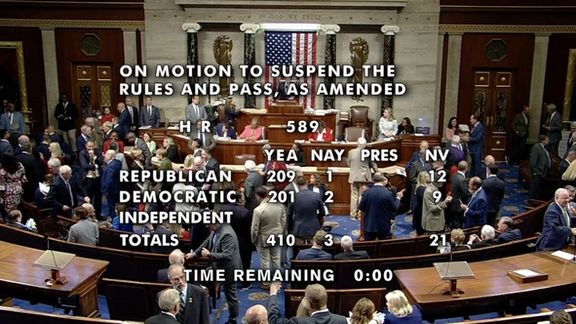
The US House of Representatives has voted 410-3 for a bill that hardens the sanctions against the Supreme Leader and the President of the Islamic Republic of Iran.
The Mahsa Amini Human Rights and Security Accountability Act (MAHSA) requires the President to report to Congress every year whether those officials should remain under current sanctions.
Ali Khamenei and Ebrahim Raisi were first sanctioned by President Donald Trump by an executive order in 2019. The Mahsa Act would make it much more difficult to lift those sanctions for the current and future administrations.
The resolution will have to pass the Senate to become law. The Senate is controlled by Democrats, who may not be as eager as the majority Republicans in the lower chamber to consider the bill.
The Mahsa Act was first introduced in January 2023, a few months after Mahsa Amini, a 22-year-old woman, was killed in hijab police custody in Tehran, triggering months of widespread protest which challenged the Islamic Republic like never before.
Referring to the regime’s human rights abuses following the protests, Rep Michael McCaul, the Chairman of House Committee on Foreign Affairs, called out the international community for “failing to compel” the oppressors of the Iranian people “to stop this abuse”.
“We have many sanction laws designed to address Iran’s regime’s human rights violations,” McCaul said, “however, it is clear that many officials and institutions in Iran have not yet been sanctioned for their role in these abuses.”
McCaul also attacked the Biden administration for its “political agenda” in dealing with Iran’s government and said: “We must not sell off the Iranian people to reach a bad nuclear deal.”
Young Iranian American activists who had worked hard for months to ensure support for MAHSA Act were jubilant on social media, and more confident about advocating a tougher US stance toward the Islamic Republic.
The rift between the House and the Biden administration over Iran policy has become clearer in recent weeks: first over Robert Malley, US Special Envoy on Iran, whose security clearance has been revoked and is currently the subject of a FBI investigation, and then the prisoner swap deal that would release $6 billion of Iran’s assets frozen in South Korea.
Secretary of State Antony Blinken has signed off a sanction waiver to allow international banks to transfer the funds. He had done so last week, AP reported, whereas the Congress was informed of the measure only on Monday (September 11).
Earlier on Tuesday, Senator Ted Cruz (R-TX) lambasted the US government for its secret deal with the Islamic Republic and said: “The Biden administration must keep their deal secret because if they disclosed it, the law requires them to come to Congress and defend it, and this appeasement is utterly indefensible.”
Jim Risch (R-ID), Ranking Member of the Senate Foreign Relations Committee, warned that the prisoner swap deal “creates dangerous incentives to capture Americans abroad”. He pointed out that striking such a deal “is tone deaf on the anniversary of Mahsa Amini death."
September 16 marks one year since the killing of Mahsa Amini.
The bill bearing her name was not the only Iran-related bill to pass the House on Tuesday. The Representatives also voted to target Iran’s production and exports of missiles and drones by sanctioning those involved in such programs. The last of the bills was specifically designed to condemn the Islamic Republic’s persecution of the Baha’i minority.
All three bills passed almost unanimously, indicating an increasingly united front against Iran’s rulers in the US House of Representatives.






